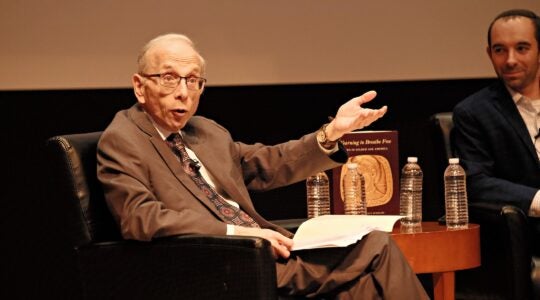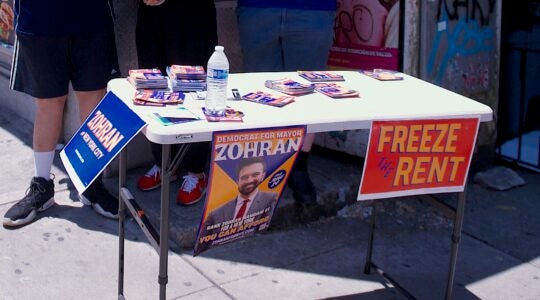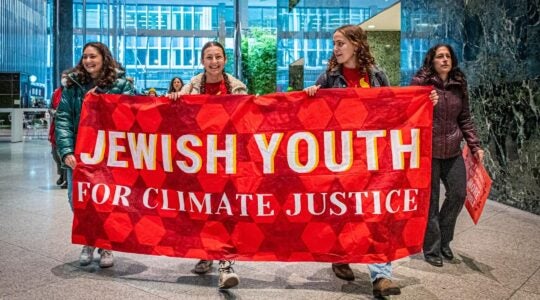Support faltered, then rebounded, this week for Natan Sharansky’s bold plan to transform the Western Wall into a site for both traditional and alternative prayer, as the Jewish Agency chair held intense discussions with Prime Minister Bibi Netanyahu’s office, seeking to establish a timeline for the project and move it forward.
No one thought the compromise would be accepted easily, converting the southwestern area of the Kotel, known as Robinson’s Arch, into a common prayer area for women’s and liberal groups that would be equal in size, appearance and stature to the traditional prayer area of the Wall.
The initial approvals – explicit or tacit – from both Orthodox and liberal fronts when Sharansky unveiled the plan last month have given way to criticism. The rabbi of the Wall, Shmuel Rabinowitz, asserted that the proposal he first said he could live with needs to be reviewed. The leader of the Women of the Wall, Anat Hoffman, was quoted as saying that the proposal is “not relevant to our needs” after a court decision last week allowing the women to pray at the Kotel.
It was her group’s desire for equal prayer opportunities that precipitated Netanyahu’s appointment of Sharansky several months ago to come up with a solution.
But acknowledging that the Women of the Wall “are only one piece of the puzzle when it comes to making the Western Wall a home for all Jews,” Hoffman wrote in the Huffington Post on Friday that “in order to put the Jewish infighting at the Wall to rest, all who are invested in the Wall’s future must participate in Sharansky’s process for changing the status quo.”
She said that is why she is “in full support of his efforts and I intend to be a willing and constructive partner. We need to find an equitable compromise that respects the feelings and unique needs of all streams of Judaism.”
Sharansky is seeking to go forward with his plan, expected to cost more than $20 million and take several years of construction, in large part because he realizes its scope and symbolism transcends the specific concerns of the Women of the Wall.
He and Netanyahu, more than most Israeli leaders, recognize the importance of diaspora Jewry’s ungoing support for Israel. They also know that the great majority of world Jewry is not Orthodox, with many, particularly among the young, feeling alienated personally and religiously from policies dictated by Orthodox law regarding marriage, divorce, conversion and burial in Israel as well as prayer at the Wall.
Rabbi Rick Jacobs, president of the Reform movement, spoke in Israel last week at the international conference of the World Union of Progressive Judaism, and said that “as long as Israel remains the only democracy that legally discriminates against the majority of Jews who are in the non-Orthodox streams, the Zionist dream of the in-gathering of the exiles in a Jewish state for all Jews cannot be fully realized.”
But Jacobs went on to reiterate his endorsement of Sharansky’s efforts. He said that when the highly regarded former refusenik described his plan to leaders of the religious streams last month in New York, “we all left unhappy,” which indicated that Sharansky “had done a very good job” because “he stretched every single one of us” to “a place called compromise.”
Despite the many remaining challenges, Rabbi Jacobs asserted “loudly and clearly” that “Sharansky’s proposals remain a unique opportunity for us.” He also praised Netanyahu for his leadership on the issue, while pointing out that “it’s not just the Kotel that needs to be liberated.” The rabbi said that women and non-Orthodox streams are discriminated against and that the “challenge is to take the outrage that is felt worldwide by non-Orthodox Jewry about the struggle for the Kotel,” and “harness” it “into social change and activism” for “the burning issues of religion and state.”
That’s a tall order, but Rabbi Jacobs is right in recognizing that the Sharansky proposal is a vital first step for Israel in proving it recognizes the concerns of the majority of world Jewry and is committed to addressing them. Not to do so would be to risk continued support – political, financial and emotional – for Israel from its most important allies, its fellow Jews.
The New York Jewish Week brings you the stories behind the headlines, keeping you connected to Jewish life in New York. Help sustain the reporting you trust by donating today.





